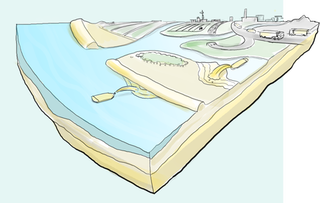Dry feet in Bangladesh
The aim of the 'Support to the Implementation of the Bangladesh Delta Plan 2100' project is to improve water management in the flood-plagued country in Southeast Asia. Delta Life talked to the deputy team leader, Giasuddin Ahmed Choudhury.
The aim of the 'Support to the Implementation of the Bangladesh Delta Plan 2100' project is to improve water management in the flood-plagued country in Southeast Asia. Delta Life talked to the deputy team leader, Giasuddin Ahmed Choudhury.
Flood risk management and water management are a major priority for both the Netherlands and Bangladesh. A large consortium of companies and government institutions from Bangladesh and the Netherlands has therefore developed the Bangladesh Delta Plan 2100 on the basis of Dutch experience. “If this plan becomes a reality, our country will be a lot better off. There will be -better risk management of floods and fewer people will lose their homes,” says Giasuddin Ahmed Choudhury, who is speaking to us from Dhaka, the capital of Bangladesh.
Choudhury has seen a lot of floods. For example, he can remember the catastrophic flood of 1998: “Most of Dhaka was submerged. Our house just escaped that fate because it's on higher ground. It wasn't long before drinking water supplies became a major problem and the water started to stink. It took eighteen days for the water to ebb away.”
Enormously expensive
The Bangladeshi government approved the Bangladesh Delta Plan 2100 in September 2018. “Initially, there were a lot of sceptics,” says Choudhury. “So we had to make sure that our plans for the scenarios and integrated water management would make a big impression.” The ‘Support to the Implementation of the Bangladesh Delta Plan 2100’ project, which is funded by the Netherlands and Bangladesh, was set up to help during the operational phase. It will run from October 2018 to September 2022.
“The support from Deltares is greatly appreciated”
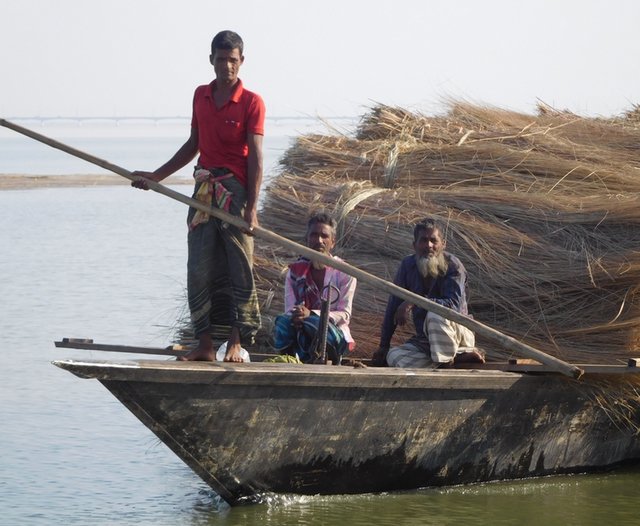
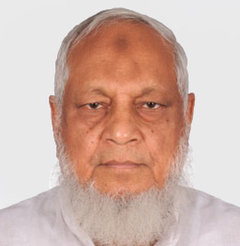
Giasuddin Ahmed Choudhury
Giasuddin Ahmed Choudhury is an expert in the field of water management. Before the ‘Support to the Implementation of the Bangladesh Delta Plan 2100’ project, he was the executive director of CEGIS, additional general director of the Bangladesh Water Development Board and the director-general of the Water Resources Planning Organisation of the Ministry of Water Management.
Choudhury has visited the Netherlands for his work many times during the course of his career. In 1999, he completed a master's degree at the Institute of Hydraulic Engineering of Delft University of Technology, where he had already followed a one-year course on land and water resources in 1981.
The biggest challenge is the financing for the project, he explains. More than sixty percent of Bangladesh is at risk of flooding so protecting the country, which is almost four times the size of the Netherlands, from the water is enormously expensive. “We are working on the establishment of a Delta Fund. The World Bank helped to draw up an investment plan and we are now asking a range of parties to invest.”
Climate change has a major impact on Bangladesh, says Choudhury. For example, the intensity of cyclones is increasing. These are violent hurricanes with enormous wind speeds, high waves, heavy rainfall and mudslides. But droughts are also a problem and, of course, sea level rise is a threat.
Close collaboration
Deltares has been working closely for years with the Center for Environmental and Geographic Information Services (CEGIS) and the Institute of Water Modelling (IWM), research institutes in Bangladesh where Choudhury worked earlier in his career. “The support from Deltares is greatly appreciated.” Asked what Deltares can learn from the cooperation with the two Bangladeshi research institutes, Choudhury replies: “They have acquired a lot of knowledge by solving the problems being faced by the country. Deltares can use this for further enhancing their knowledge base.”
He mentions, among other things, the formulation of a range of scenarios in the delta plan and the teamwork during the application of a meta-model. He had already worked in a previous job with models of this type, “a decision tool to support the formulation, analysis and evaluation of alternative projects and programs for the purpose of implementation,” he explains. The focus is on the interaction between different effects rather than the details of individual processes. That turned out to be very useful in this case. “A meta-model allowed us to plan the project better and select the best options for policymakers.”
The three research institutes are devoting a lot of attention to integrated water management in the delta plan. Choudhury explains: “We try to ensure that all the organisations in Bangladesh involved with water in any way work well together. We are also trying to raise the expertise level in these organisations.” He would like to see Deltares and the Bangladeshi research institutes work together even more. “For example, a few years of on-the-job training at Deltares would be very useful. Because the institute is constantly enhancing knowledge and refining different analytical tools, on-job training will help Bangladeshi experts acquire expertise for developing analytical tools to solve the problems faced by the country in a better way.”
“A few years of on-the-job training at Deltares would be very useful.”
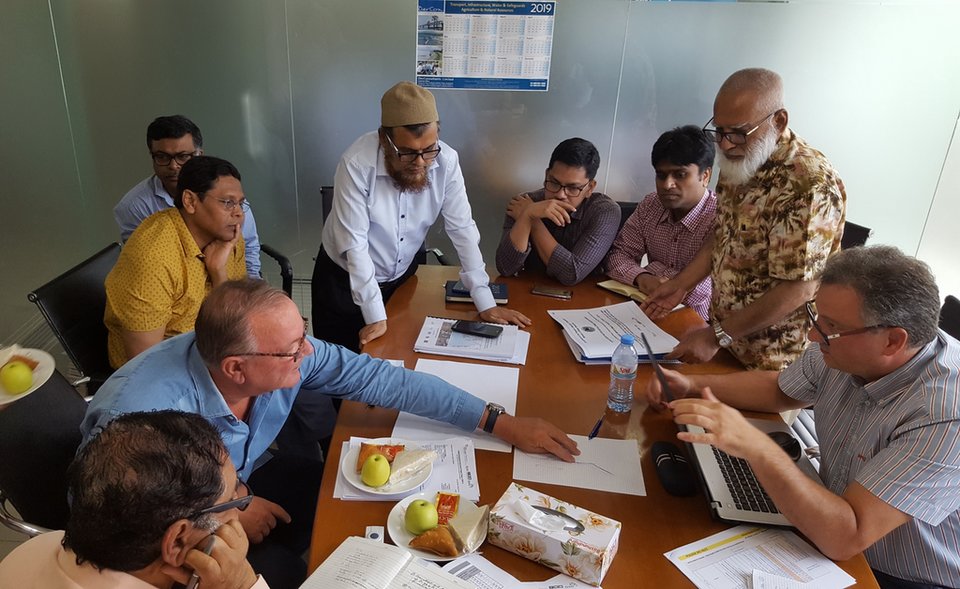
Meeting in the CEIP office under the guidance of Dutch water experts.
Drinking water and irrigation
Water management is not only about flooding but also, for example, about clean drinking water, drains and the irrigation of agricultural land, explains Choudhury. “We have a large population of more than 160 million people and so we need enormous amounts of food, especially rice. We also grow it in the dry season now and that requires a lot of water.”
Bangladesh is developing rapidly and it is expected to become a upper middle-income country by 2030. “The delta plan will help to reduce poverty drastically,” expects Choudhury. “In the Netherlands, water management is mainly about risk management. But we also have a lot of socio-economic challenges.” So he knows that technical solutions aren't enough. “They also have to be socially and environmentally acceptable, and economically viable. That's what we're working on now.
How is Deltares active in Bangladesh?
- Deltares has been working on mitigating bank erosion on the Brahmaputra-Jamuna for nearly thirty years.
- Deltares is advising the World Bank and the development of a shipping channel and economic corridor between Kolkata and Assam in India via rivers in Bangladesh.
- Drinking water supply for Dhaka (pollution and falling groundwater levels).
- Water management in polders.
More information
If you want to know more about this study, don't hesitate to get in touch.
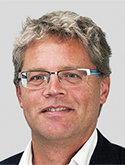
William Oliemans
Expert Delta Management
Bangladesh has no fewer than 500 rivers. The land is located in the world's largest delta less than five metres above sea level. Floods are an annual problem, especially during the rainy season between June and September, when a lot of meltwater comes down from the Himalayas.
